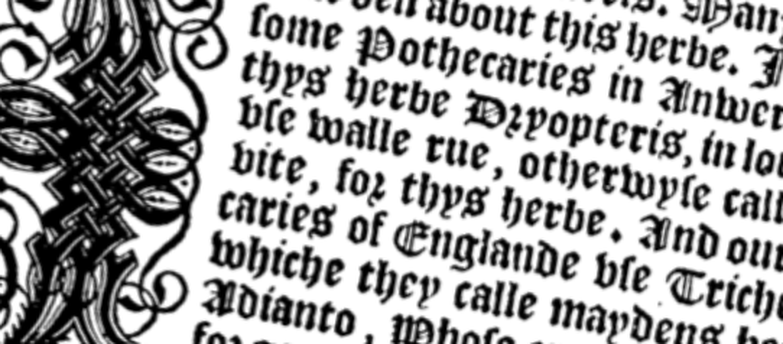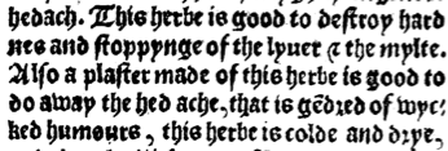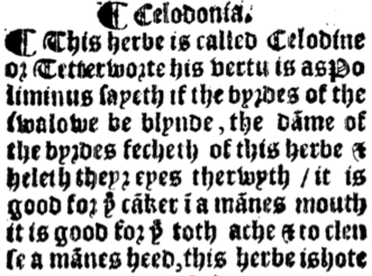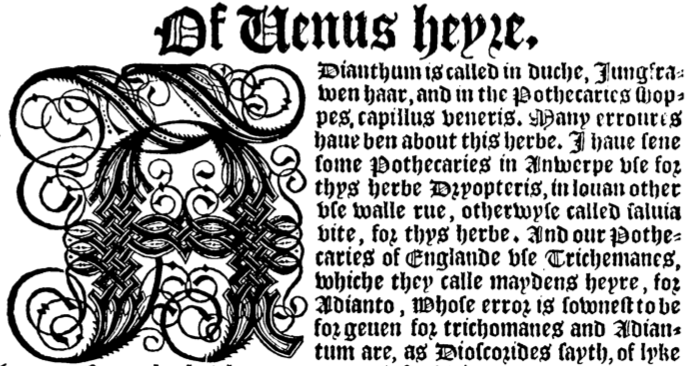Reading Old English Medical Books
|
Reading Old English Books takes a little while to get used to. And the earlier they are, the harder they can be to read. Books printed during the 16th century can use old English fonts, irregular spelling, and some unusual conventions.
As I have often witnessed colleagues have great difficulty reading even simple sentences, and now through resources such as Google books there is a large amount of old texts available for study, I have created this brief introduction to reading old books, covering some main difficulties that arise for the inexperienced. |
ADVERTISEMENT:
|
s & f
The letter ‘s’ is often written as ‘f’, for example shop may be written as ‘fhop’; ‘fo’ means so; gloss may be written ‘glofs’
u & v
‘v’ may be used in place of ‘u’, for example ‘qvart’ maybe written for quart. Also, w maybe written as vv (twin ‘v’s). When considered with the use of ‘f’ for ‘s’, some old texts may have ‘vfe’ for use.
i & j
The letter ‘j’ is a relatively new addition to the language, so was often represented by the letter ‘i’, just as it was in Latin. For example ‘iaundice’ is commonly used for jaundice in pre 1600 writings.
y & i
'y' may be used for 'i', for example, 'blynde' is an old spelling for 'blind' and 'byrdes' for 'birds'
missing or added 'e'
Often 'e' is added, for example 'blynde' and 'Byrdes', as given above. However, other times such as 'therwith', and e may be dropped.
Ending in ‘eth’ or ‘ath’
‘avoideth’ may be written for avoid; ‘hath’ for has etc.
A dash above a vowel indicates an ‘n’ or ‘m’ follows; for example ‘seve’ with a dash over the last ‘e’ means seven; ‘the’ with a dash over the ‘e’ indicates them; ‘ouce’ with a dash over the ‘u’ means ounce.
Early English books often have phonetic or incorrect spelling; for example hair maybe written hayre;
Abbreviations
ana, means ‘of each a like amount’
M, means manipulum; a handful
ADVERTISEMENT:
Some Samples
... headache. This herb is good to destroy hard-
ness and stopping of the Liver & the Milt [Spleen].
Also a plaster made of this herb is good to
do away the headache, that is (en)gendered of
wicked humors, this herb is cold and dry.
(From Macers Herbal)
ness and stopping of the Liver & the Milt [Spleen].
Also a plaster made of this herb is good to
do away the headache, that is (en)gendered of
wicked humors, this herb is cold and dry.
(From Macers Herbal)
Celandine
This herb is called Celandine
or Tetterwort, his virtue is as
Poliminus says if the birds of the
swallow be blind, the dame of
the birds fetches of this herb &
heals their eyes therewith; it is
good for the canker in a mans mouth,
it is good for the toothache and to cleanse
a means head, this herb is hot ...
(From 'A Book of the Properties of Herbs', Anon, 1541?)
This herb is called Celandine
or Tetterwort, his virtue is as
Poliminus says if the birds of the
swallow be blind, the dame of
the birds fetches of this herb &
heals their eyes therewith; it is
good for the canker in a mans mouth,
it is good for the toothache and to cleanse
a means head, this herb is hot ...
(From 'A Book of the Properties of Herbs', Anon, 1541?)
ADVERTISEMENT:
Of Venus Hair
Adiantum is called in Ducth, Jungfra-
wen haar, and in Apothecaries shops,
Capillus Veneris. Many errors
have been about this herb. I have seen
some Apothecaries in Antwerp use for
this herb Dryopteris, in louan other
use Wall Rue, otherwise called Salvia
Vitae, for this herb. And our Apothe-
caries of England use Trichomanes,
which they call Maidens Hair, for
Adianto, whose error is soonest to be
forgiven for Trichomanes and Adian-
tum are, as Dioscorides says, of like ...
(Turners Herbal, 1551)
Adiantum is called in Ducth, Jungfra-
wen haar, and in Apothecaries shops,
Capillus Veneris. Many errors
have been about this herb. I have seen
some Apothecaries in Antwerp use for
this herb Dryopteris, in louan other
use Wall Rue, otherwise called Salvia
Vitae, for this herb. And our Apothe-
caries of England use Trichomanes,
which they call Maidens Hair, for
Adianto, whose error is soonest to be
forgiven for Trichomanes and Adian-
tum are, as Dioscorides says, of like ...
(Turners Herbal, 1551)





